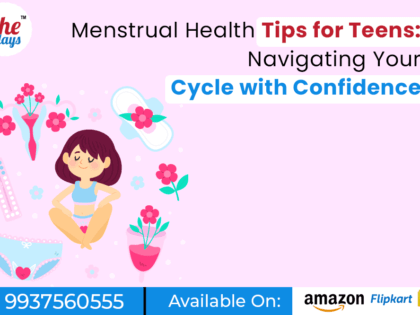What can cause an early period?
At times you must have gotten your periods early, but there is no need to worry. This happens for various reasons.
The menstrual cycle is different for everyone. The “first day” of your period starts from the day you “get your current period,” and the “end day” of your current period “marks as the first day” of your next cycle, and so on.
The number of days spent bleeding differs from individual to individual, and a regular period cycle lasts somewhere between 21 to 39 days. The average person bleeds for three to seven days.
However, if your period cycle is often shorter than 21 days, causing you to bleed earlier than usual, it might have some underlying cause.
Continue reading to find out some reasons for early periods, which signs to look out for, and when to consult your doctor.
Stress
The most problematic and the most common one. In this fast-paced life, one can stress over anything from job, money, house, children, and whatnot. But overstressing can never bring anything good, especially for our ladies.
Extreme stress can cause your hormone levels to be disrupted, resulting in irregular periods. If you have nervous tension or have recently experienced a disturbing incident, your hormones may be out of whack because of it.
Apart from the period related problems, stress can also cause:
- Sleep problems
- Stomach upset
- Change in sex drive
- Fatigue
- Chest pain
- Muscle tension or pain
- Headache
- Difficulty concentrating
- Unexplained weight gain or loss
Intense exercise
Being active is the best way to stay away from a stroke, diabetes, heart disease, etc., and it even helps one regulate their period. But intensive workouts can have a negative effect on your body and your menstrual cycle.
Strenuous exercise can trigger irregular periods or even the termination of your menstruation. This disorder is often linked to athletes who practice for several hours per day. It is most typical in weight-restricted sports like gymnastics or ballet.
Workout has little effect on your cycles unless you burn far more calories than you consume. Because of this, your body is unable to generate the number of reproductive hormones it requires to ovulate normally as you lack energy.
Puberty
Puberty usually begins between the ages of eight to thirteen, and a variety of bodily changes accompanies it.
During this time, the primary hormones, i.e., the reproductive hormones, is being produced, and it somewhat takes over all the other hormones and affects the body in different ways.
Throughout your childbearing years, these hormones will affect your menstrual cycle.
These hormones can be inconsistent in the first few years after getting your period, meaning that the menstruation between your cycles can be shorter or longer than expected.
Weight fluctuations
Significant weight shifts are often linked to missing, irregular, or early periods. Menstruation complications are common in people who lose a lot of weight quickly. Moreover, eating disorders, gastric bypass surgery, and excessive dieting may all cause this.
A sudden jump into starvation mode gives your body signals that it has to save energy; therefore, it begins to shut itself down and conserves energy for vital functions such as breathing, causing disturbances to occur in releasing reproductive hormones.
Perimenopause
The transition of a woman’s body from being fertile to infertile is called perimenopause. In other words, when a woman’s body is transforming and reaching the menopause stage or age. After one reaches menopause, they can not bear a child. This shift generally starts in between the mid to late forties and can last for about four years.
During this transition, one’s hormone levels fluctuate and vary dramatically, leading to disruption in every month’s ovulation. This can result in irregular cycles, with one menstruating later or earlier than normal.
And not only this; perimenopause can cause some of the given symptoms too:
- Irritability
- Difficulty sleeping
- Hot flashes
- Missed periods
- Vaginal dryness
- Periods to be lighter or heavier than usual
Thyroid disease
Thyroid disease is estimated to affect one out of every eight females at some point in their lives.
Thyroid disorders lead the body to produce too much or too little thyroid hormone.
This hormone is essential for a variety of bodily functions, along with metabolism and menstruation.
A person’s symptoms depend on what type of thyroid one has, i.e., does one have hypothyroidism or hyperthyroidism.
You can also experience the following symptoms in addition to the early period cycle:
- Sudden weight loss or gain
- Difficulty sleeping
- Light or heavier than usual
- Faster or slower heart rate than usual
Undiagnosed or uncontrolled diabetes
Blood sugar levels are found to be significantly higher than average when diabetes is poorly treated or goes undiagnosed. Several reports that studied diabetic people affirm that numerous women with type 2 diabetes had irregular menstruation cycles in the years leading up to their diagnosis.
Moreover, apart from irregular periods, diabetes can also lead to the following complications:
- Unexpected weight loss
- Increased thirst
- Excessive urination, especially during nighttime
- Poor recovery or healing of wounds
Endometriosis
Endometriosis is a condition in which the tissues, similar to endometrial tissue, begin to grow outside the uterine cavity, causing lower back pain, excessive menstrual bleeding with unbearable pain, and irregular period cycles. One can also experience pain occurring during or after sex. This condition is quite similar to Adenomyosis but distinct in several ways.
The condition of Endometriosis is estimated to affect 25 million Indian women.
PCOS (Polycystic ovary syndrome)
Polycystic ovary syndrome, aka PCOS, can develop or can be discovered during the childbearing years. We used the word “discovered” because many women do not have a clue that they are suffering from PCOS until they face complications during their pregnancy.
PCOS is induced by a hormonal imbalance. It is a common disorder in India, affecting approximately one in every five women, i.e., around 20% of women in India suffer from Polycystic ovary syndrome.
If PCOS is left untreated, it can cause a long list of health issues like:
- Periods becoming unpredictable, infrequent, or absent
- Very light or heavy period flow
- Infertility
- High Blood pressure
- Depression
- Type 2 diabetes
- Fatty liver disease
- Skin issues
- Excessive hair growth on body and face
- Sleep apnea
- Obesity
- Cardiovascular disease
Certain STIs (Sexually Transmitted Infections)
Some STIs like gonorrhoea and chlamydia, which are pretty common, can make you feel that you are having your periods early by causing blood-tinged discharge or spotting between periods.
Moreover, STIs can also provoke:
- Abdominal pain
- Burning or pain when peeing
- Pain during sex
Hormonal birth control
Hormonal birth control pills or hormonal contraceptives are used to avoid pregnancy. It directly affects ovulation by obstructing egg release from the ovaries. This is done by creating a thick mucus in the cervix or making the uterus lining thin; thus, preventing the sperm from reaching the egg.
As a result, your following period cycle schedule might get disrupted, leading to late or early periods. When will your next period cycle starts will totally depend on what day of your current periods you began to take these hormonal pills?
Apart from these pills, if one uses Depo-Provera shot or intrauterine devices (IUDs), they can also experience irregularities in their period cycle for some time. In some cases, the use of these contraceptive methods may also cause breakthrough bleeding.
Until your body adjusts to these contraceptives (which might take two to three months), additionally you might also encounter:
- Nausea
- Headaches
- Sore breasts
- Cramping
Anticoagulants
Taking anticoagulants, commonly known as blood-thinning medication, can lead to heavy flows for a prolonged time. Although natural blood-thinning occurs in our body during menstruation, intake of anticoagulants can lead to early as well as heavier bleeding during periods.
Altering routine
Frequently switching between routines or deviation from regular patterns may affect your period cycle by disrupting your hormones, causing early or late periods.
Generally, women who work shift jobs like doctors, nurses, hoteliers, etc., experience fluctuating period cycles.
However, studies can not directly point out why this happens; researchers believe that it is related to the disturbance in our circadian rhythm, further influencing our sleep hormone called the melatonin.
Tips To Manage Your Periods
Unless you have extensive symptoms of an underlying issue, irregular periods are not concerning and will get on track after one or two months.
Nevertheless, to keep track of your menstruation cycle and resolve what’s causing your periods to come early, here are some tips.
- Maintain a healthy weight
- Stress management
- Avoid extensive training or exercising
- A balanced and healthy diet is the key
- Seven to nine hours of sleep is a must
- Keep a period tracker/ app
Well-Wisher’s Words: When to seek a doctor’s help?
If you aren’t experiencing extreme discomfort that stops you from doing your daily activities, having early periods isn’t severe. Yet, keep an eye over the symptoms if they start to show up, and additionally, keep track of your periods for at least two to three months, continuously. This will include the flow, timing, or any other signs which may arise.
If you have any possibility of getting pregnant, and if you suspect that you might have experienced a miscarriage, immediately seek medical attention.
Keeping a tab of all information will come in handy while discussing your case, and doctors will be able to help you more efficiently.






